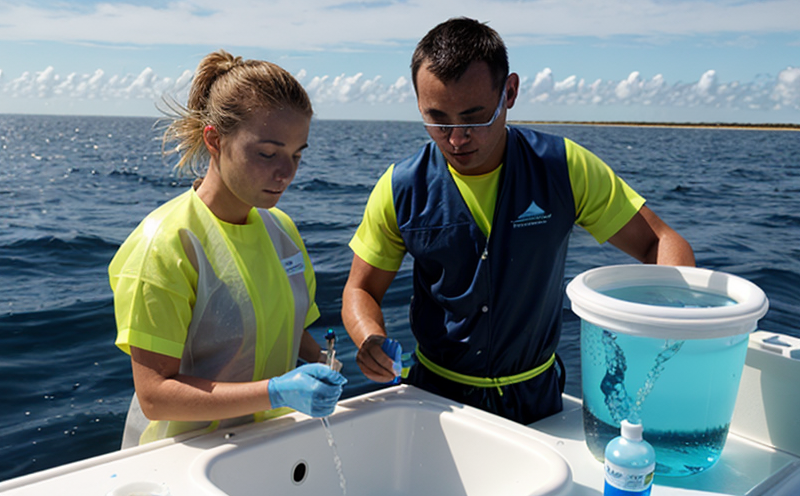ASTM D7573 Total Phosphorus Test in Seawater
The ASTM D7573 standard outlines a procedure for determining total phosphorus concentrations in seawater samples. This test is crucial for environmental monitoring and compliance with regulatory standards, particularly relevant to sectors like coastal management, water quality control, and marine science research.
Total phosphorus levels are critical indicators of water quality as they can contribute significantly to eutrophication—a process where excessive nutrients cause algal blooms that deplete oxygen in the water. Eutrophication can have severe impacts on aquatic ecosystems, affecting both marine life and human health. This test helps in mitigating such risks by providing accurate measurements.
The methodology involves several steps: sample collection, preservation, digestion, and analysis. Sample collection is typically conducted at predetermined intervals to ensure data accuracy. Samples are preserved with nitric acid to prevent biological activity and to stabilize the phosphorus content. Digestion often uses strong acids like perchloric or sulfuric acid to break down organic matter into simpler compounds.
The analytical technique used for this test is flame photometry, which measures the light emitted by excited phosphate ions in a flame. This method provides high precision and accuracy, making it suitable for environmental applications where minute concentrations of phosphorus are significant.
Understanding the results from ASTM D7573 is essential for stakeholders involved in water resource management. Compliance officers need to ensure that their operations adhere to environmental regulations. Quality managers can use this data to improve processes and maintain product quality standards. R&D engineers may find it useful when developing new products or technologies aimed at enhancing water treatment or monitoring.
Proper interpretation of the test results helps in setting appropriate limits for phosphorus discharge into natural waters, thereby contributing to sustainable practices. For instance, if total phosphorus concentrations exceed certain thresholds, corrective actions might be necessary to prevent further pollution.
The ASTM D7573 standard is widely recognized and used globally, ensuring consistency across different laboratories and jurisdictions. This uniformity fosters trust among stakeholders involved in environmental protection initiatives.
Scope and Methodology
| Step | Description |
|---|---|
| Sample Collection | Collect seawater samples at designated sites following standard procedures. |
| Preservation | Add nitric acid to the collected samples to stabilize phosphorus content and prevent biological activity. |
| Digestion | Use strong acids such as perchloric or sulfuric acid to digest organic matter into simpler compounds. |
| Analysis | Analyze the sample using flame photometry to measure total phosphorus concentration accurately. |
The ASTM D7573 procedure ensures reliable and consistent results, making it a cornerstone for environmental monitoring programs. Compliance with this standard is mandatory in many regions due to its role in safeguarding marine ecosystems from harmful pollutants like phosphorus.
Eurolab Advantages
At Eurolab, we bring extensive experience and expertise to your ASTM D7573 testing needs. Our team of certified analysts ensures that every sample is handled with precision and care. We employ state-of-the-art laboratory equipment calibrated according to international standards, guaranteeing accurate measurements.
Our laboratories are equipped with advanced analytical instruments capable of handling complex samples like seawater effectively. This capability allows us to provide precise total phosphorus concentrations, crucial for meeting regulatory requirements accurately.
We also offer comprehensive reporting services that include detailed analysis and interpretation of results. Our reports are not only informative but also actionable, helping you make informed decisions regarding your water quality management practices.
Our commitment to excellence is further reflected in our adherence to international standards such as ASTM D7573. This ensures that our tests meet the highest industry benchmarks, providing you with reliable data for decision-making processes.
Environmental and Sustainability Contributions
- Promotes sustainable water management practices by ensuring compliance with environmental regulations.
- Aids in preventing eutrophication through accurate phosphorus concentration monitoring.
- Facilitates better resource allocation for managing marine ecosystems effectively.
- Supports scientific research aimed at understanding and addressing aquatic pollution issues.
By leveraging the ASTM D7573 standard, Eurolab contributes significantly to environmental sustainability efforts. Our rigorous testing procedures play a vital role in maintaining ecological balance in our oceans and seas.





